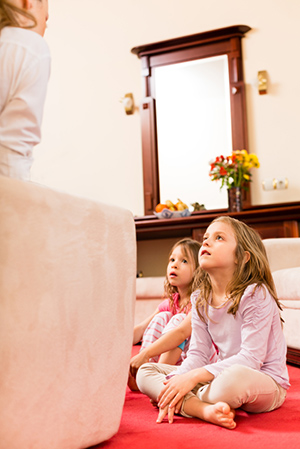Sammy Spider knows the Torah is the Jewish people favorite story. “That's why they like to read it again and again,” he says in the Sylvia Rouss book, Sammy Spider’s First Simchat Torah, illustrated by Katherine Janus Kahn.
 Simchat Torah is the holiday that celebrates the annual completion of the reading of the Torah and the Jewish people’s excited anticipation of reading the story all over again in the year ahead.
Simchat Torah is the holiday that celebrates the annual completion of the reading of the Torah and the Jewish people’s excited anticipation of reading the story all over again in the year ahead.
Families, too, have their own stories worth telling — and re-telling. Do the children in your family love to hear all about Grandma’s life as a little girl or what daddy did growing up? They’re not alone.
THE JEWISH PEOPLE’S FAVORITE STORY
As Rabbi Baruch S. Davidson explains in the Chabad.org Q&A piece, “Why Is the Torah Read on Mondays and Thursdays?,” it was Moses who instituted the standard that the Torah be read three days a week and the prophet Ezra the Scribe who “introduced the practice of reading the Torah on Mondays and Thursdays in the 4th century BCE.”
Since that time, reading the Torah has remained an important Jewish tradition. At least three times each week, the Jewish people read and listen to the rich histories and value-driven stories of the Torah. Simchat Torah celebrates this tradition.
YOUR FAMILY’S FAVORITE STORIES
Each family has cherished stories. Some of them are funny (like the story of the time your son decided to put Play-Doh in the electrical sockets). Some of them are serious -- telling of an illness or accident, for example. Some of them recount the family legacy, such as an immigration story or the retelling of a significant historical achievement.
Children benefit from whatever stories your family tells. In her Atlantic Monthly online report, “What Kids Learn From Hearing Family Stories,” Elaine Reese writes.
She explains, “Experimental studies show that when parents learn to reminisce about everyday events with their preschool children in more detailed ways, their children tell richer, more complete narratives to other adults one to two years later compared to children whose parents didn’t learn the new reminiscing techniques.” She adds, “Children of the parents who learned new ways to reminisce also demonstrate better understanding of other people’s thoughts and emotions.”
What’s more, Reese explains, family storytelling can compliment book reading. “Books contain narratives, but only family stories contain your family’s personal narratives,” she writes. “Fortunate children get both.”
CHILDREN & STORYTELLING
Family storytelling can teach children a lot — not only about their family roots and relationships, but also about sequencing, writing, and word choice. PBS Kids Lab offers a family game to help children better understand the structure and elements of storytelling while, at the same time, hearing some great family stories.
The PBS Kids Lab home activity, “Martha Speaks: Sharing Family Stories,” presents a family game that requires the players to interview each other, learn family stories, and then re-tell them in pieces.
What family stories do you have that are worth repeating year after year? What are your favorite family stories that you will pass along to your own children?
October 13, 2014